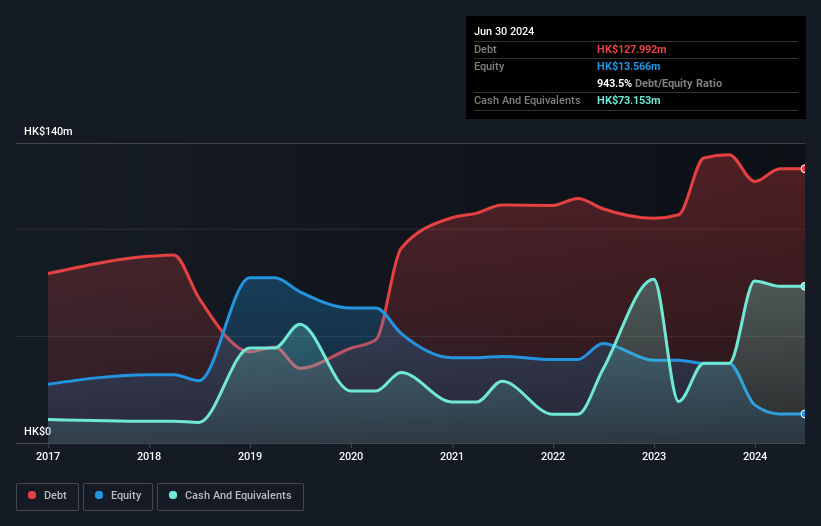Hanvey Group Holdings (HKG:8219) Has Debt But No Earnings; Should You Worry?

David Iben put it well when he said, 'Volatility is not a risk we care about. What we care about is avoiding the permanent loss of capital.' So it might be obvious that you need to consider debt, when you think about how risky any given stock is, because too much debt can sink a company. Importantly, Hanvey Group Holdings Limited (HKG:8219) does carry debt. But is this debt a concern to shareholders?
When Is Debt A Problem?
Debt is a tool to help businesses grow, but if a business is incapable of paying off its lenders, then it exists at their mercy. Ultimately, if the company can't fulfill its legal obligations to repay debt, shareholders could walk away with nothing. However, a more common (but still painful) scenario is that it has to raise new equity capital at a low price, thus permanently diluting shareholders. Of course, debt can be an important tool in businesses, particularly capital heavy businesses. The first thing to do when considering how much debt a business uses is to look at its cash and debt together.
View our latest analysis for Hanvey Group Holdings
What Is Hanvey Group Holdings's Debt?
As you can see below, Hanvey Group Holdings had HK$128.0m of debt, at June 2024, which is about the same as the year before. You can click the chart for greater detail. On the flip side, it has HK$73.2m in cash leading to net debt of about HK$54.8m.

How Healthy Is Hanvey Group Holdings' Balance Sheet?
Zooming in on the latest balance sheet data, we can see that Hanvey Group Holdings had liabilities of HK$126.2m due within 12 months and liabilities of HK$52.9m due beyond that. Offsetting this, it had HK$73.2m in cash and HK$38.1m in receivables that were due within 12 months. So its liabilities total HK$67.9m more than the combination of its cash and short-term receivables.
This deficit casts a shadow over the HK$37.1m company, like a colossus towering over mere mortals. So we definitely think shareholders need to watch this one closely. At the end of the day, Hanvey Group Holdings would probably need a major re-capitalization if its creditors were to demand repayment. The balance sheet is clearly the area to focus on when you are analysing debt. But you can't view debt in total isolation; since Hanvey Group Holdings will need earnings to service that debt. So if you're keen to discover more about its earnings, it might be worth checking out this graph of its long term earnings trend.
In the last year Hanvey Group Holdings had a loss before interest and tax, and actually shrunk its revenue by 58%, to HK$110m. To be frank that doesn't bode well.
Caveat Emptor
Not only did Hanvey Group Holdings's revenue slip over the last twelve months, but it also produced negative earnings before interest and tax (EBIT). Indeed, it lost a very considerable HK$19m at the EBIT level. Considering that alongside the liabilities mentioned above make us nervous about the company. We'd want to see some strong near-term improvements before getting too interested in the stock. Not least because it had negative free cash flow of HK$13m over the last twelve months. So suffice it to say we consider the stock to be risky. When analysing debt levels, the balance sheet is the obvious place to start. However, not all investment risk resides within the balance sheet - far from it. We've identified 4 warning signs with Hanvey Group Holdings (at least 3 which are concerning) , and understanding them should be part of your investment process.
Of course, if you're the type of investor who prefers buying stocks without the burden of debt, then don't hesitate to discover our exclusive list of net cash growth stocks, today.
If you're looking to trade Hanvey Group Holdings, open an account with the lowest-cost platform trusted by professionals, Interactive Brokers.
With clients in over 200 countries and territories, and access to 160 markets, IBKR lets you trade stocks, options, futures, forex, bonds and funds from a single integrated account.
Enjoy no hidden fees, no account minimums, and FX conversion rates as low as 0.03%, far better than what most brokers offer.
Sponsored ContentValuation is complex, but we're here to simplify it.
Discover if Hanvey Group Holdings might be undervalued or overvalued with our detailed analysis, featuring fair value estimates, potential risks, dividends, insider trades, and its financial condition.
Access Free AnalysisHave feedback on this article? Concerned about the content? Get in touch with us directly. Alternatively, email editorial-team (at) simplywallst.com.
This article by Simply Wall St is general in nature. We provide commentary based on historical data and analyst forecasts only using an unbiased methodology and our articles are not intended to be financial advice. It does not constitute a recommendation to buy or sell any stock, and does not take account of your objectives, or your financial situation. We aim to bring you long-term focused analysis driven by fundamental data. Note that our analysis may not factor in the latest price-sensitive company announcements or qualitative material. Simply Wall St has no position in any stocks mentioned.
About SEHK:8219
Hanvey Group Holdings
An investment holding company, designs, develops, manufactures, and distributes watch products on an original design manufacturing basis in Hong Kong and the People’s Republic of China.
Moderate and slightly overvalued.
Market Insights
Community Narratives



